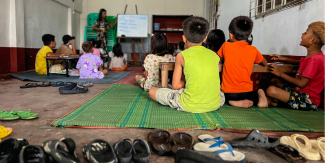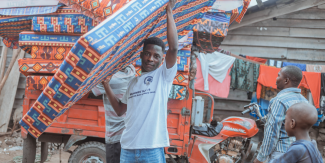MARCH 13, 2024 - LEODY TAN ECHAVEZ III
In the remote corners of Myanmar, the lack of access to clean water has been an arduous challenge for countless families. The journey to retrieve water from distant sources often stretches over many kilometers, leaving individuals grappling with the scarcity of this basic necessity.
The repercussions are dire: waterborne diseases, compromised hygiene, inadequate sanitation, and limited opportunities for education and employment. Against the backdrop of a nation plagued by civil unrest, the struggle for survival has intensified. The ongoing conflict has uprooted lives, with countless civilians displaced and homes destroyed. Farmers find their fields barren due to the scourge of war, while inflation and soaring prices make even basic sustenance a battle. The crisis has given rise to an urgent need for health education, as communities must now fend for their own well-being amid dwindling resources and rising threats of diseases.
Yet, amid these grueling situations, a glimmer of hope emerges. In partnership with Nazarene Compassionate Ministries, undeterred by strife, local Nazarene churches have initiated a life-transforming project to provide clean water, sanitation, and hygiene solutions for the affected communities. This endeavor seeks to quench physical thirst and instill a renewed sense of compassion and discipleship through the local churches' involvement.

The driving force behind this transformative project is a fervent desire to alleviate the community's suffering. After witnessing people travel great distances for a sip of clean water, local churches took on a mission to help the community. The vision extended beyond mere provision; it encompassed trust-building, relationship-forging, and a profound demonstration of love in action. The project was conceived as an embodiment of God's love and an opportunity for the local churches to show the community the same care they experienced from God.
The local churches' engagement with the community was proactive and holistic. Planning, labor, and maintenance of the wells became shared endeavors, fostering a sense of ownership and unity. The once-daunting task of accessing clean water was replaced with the convenience of wells within arm's reach. This transformation, however, transcended the physical realm. Through this compassionate service, the local churches fostered a deeper connection with the community, enabling them to share the Word of God and bring the message of hope and salvation.
TESTIMONY
The story of Maung Sai serves as a testament to the transformative power of the water well project. Initially a non-believer, Sai's encounter with the local pastor, James, altered the trajectory of his life. When asked to contribute to the well-drilling efforts, he willingly participated. As he labored alongside the pastor, conversations about faith and God were interwoven with the physical work. Through these interactions, Sai's heart softened, eventually leading him to embrace Christianity. Sai was baptized by the pastor, and his new life was paralleled by the successful drilling of the well—a symbol of both spiritual and physical rejuvenation.

The local church's support for Maung Sai extended far beyond his conversion. Regular fellowships, prayer sessions, and Bible studies bolstered his faith and nurtured his spiritual growth. Recognizing his commitment to serve, the church facilitated his enrollment at Chapman International College in Yangon, nurturing his potential for ministry. Compassion, as exemplified through the well project, played a pivotal role in Maung Sai's transformation, serving as a bridge that connected him to a deeper spiritual understanding.
MEETING THE NEEDS
For the local churches, identifying the need to access water was not merely an administrative task but a journey of understanding the community's struggles. Visits and discussions during evangelism efforts allowed the churches to grasp the full extent of the challenge. Their involvement went beyond well digging; they invested in the necessary infrastructure to ensure long-term functionality. Installing electric power meters and a compressor helped safeguard the community's access to clean water.
Through the wells, the churches addressed a multifaceted range of needs. In addition to enhancing physical health, the clean water also sparked trust and relationship-building. This comprehensive approach, grounded in compassionate discipleship, aimed at not only quenching the community’s physical thirst but also satisfying spiritual hunger. The commitment to long-term sustainability extended beyond the project's inception. A dedicated group emerged, tasked with the care and upkeep of the wells. Infrastructure improvements, including walls and roofs, fortified the wells against the elements. This approach transformed maintenance into a communal endeavor, uniting the community in their shared responsibility.

As the community embraced its role in the wells' upkeep, a deep sense of ownership blossomed. These initiatives not only cultivated practical skills among community members but also instilled virtues of patience, care, and responsibility—integral aspects of discipleship. The wells became symbols of the partnership between the local church and the community, illustrating the symbiotic nature of compassionate ministry and sustainable development, which opened doors for deeper connections and evangelism.
A NEWFOUND HOPE
In the face of ongoing conflicts, the water well project became a beacon of hope for both the local church and the community. Clean water was not only a source of physical relief but a conduit for building trust and understanding amid adversities. The wells acted as communal gathering points, strengthening relationships and offering solace in times of strife.
When faced with challenges, the local church found a unique platform for discipleship and evangelism. The well project laid the groundwork for conversations about faith, providing an entry point for sharing the gospel and building trust through compassion. The relationships nurtured through this compassionate endeavor transformed opposition into openness, resulting in a fertile ground for the seeds of faith to flourish. The water well project's impact not only transcended clean water access but also acted as a catalyst for broader development, as relationships formed around the wells paved the way for evangelism and discipleship. The wells became spaces to reduce logistical struggles and remove barriers between the local church and the unbelievers. Once symbols of adversity, these spaces were transformed into arenas of connection, dialogue, and transformation.
LESSONS LEARNED
The Myanmar water wells project offers invaluable insights for churches and organizations seeking to practice compassionate discipleship. Beyond the act of helping those in need, the project showcases the potential for ministry and evangelism, which are not separate entities but intertwined facets of a greater whole, through practical acts of love. The lessons extend beyond the confines of Myanmar, providing a roadmap for replication. Through practical service, the local church ignited a transformative process that brought together physical and spiritual well-being.

As the project continues to flourish, it stands as a testament of compassion’s transformative power, demonstrating that even in the midst of conflict, love in action has the potential to renew lives, communities, and faith.





